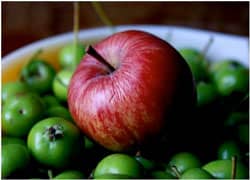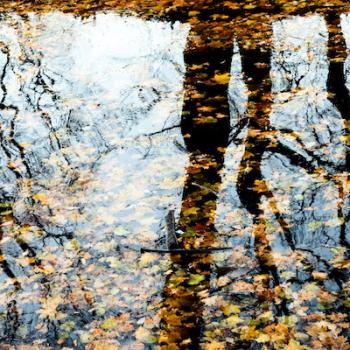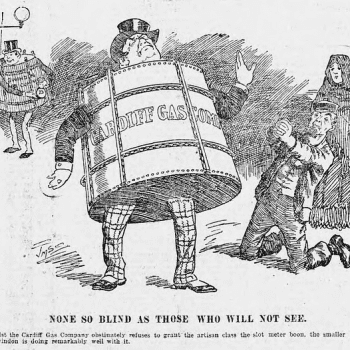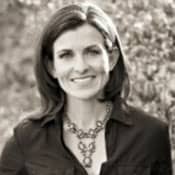By Joanna Brooks
 Tara and I sit together at the Jewish preschool orientation breakfast. It is August. My green-eyed Jewish-Mormon daughter Ella and her brown-eyed Jewish-Hindu son Ari play together in the courtyard, under the fruiting pomegranate tree. Inside at the head of the table sits the rabbi. On his right hand lives his orange-nosed puppet-dog, Kelev. Kelev is a big hit with the preschool kids. We are not sure why Kelev is here at the parent breakfast.
Tara and I sit together at the Jewish preschool orientation breakfast. It is August. My green-eyed Jewish-Mormon daughter Ella and her brown-eyed Jewish-Hindu son Ari play together in the courtyard, under the fruiting pomegranate tree. Inside at the head of the table sits the rabbi. On his right hand lives his orange-nosed puppet-dog, Kelev. Kelev is a big hit with the preschool kids. We are not sure why Kelev is here at the parent breakfast.
The parents wipe cream cheese from the corners of their mouths and begin to ask questions. Up goes the hand of the intermarried Jewish mother who, we have noticed, always comes alone to Shabbat services, wrestling three small children by herself.
"My husband says he's just not interested," she tells the group. "But my son asked, ‘Why doesn't Daddy come to temple with us?' What do I say?"
"You know what your son is really asking?" asks the rabbi.
I whisper to Tara: "Your son is really asking, ‘Why is Daddy such a jackass?'"
The rabbi has a different answer. He strips Kelev from his fist and leaves the orange-nosed puppet-dog on the table, an eviscerated heap of felt. "Your son is really asking, ‘What am I?'" According to the rabbi, sociologists say children form their religious identities before age five. He tells us that we must avoid confusion at all costs. "Your children need clear and unequivocal messages about their Jewish identity," the rabbi says.
Tara raises her hand: "My son has a rich Hindu heritage which goes back thousands of years. Are you asking me to create a sense of division between my husband and our son?"
The rabbi wears a blank but resolute expression, then repeats himself as if we did not hear the first time: "Your children need clear and unequivocal messages about their Jewish identity."
The rabbi believes he is fighting for the very survival of his people. Identity is the name of the trench he will not surrender. But all around him on the plains of history, new tribes are gathering. We vow not to be jackasses. We vow to love what our husbands and wives love. We embrace the mysterious unities forged in the bodies of our clear-eyed children. We give them long and composite names remembering all of their ancestors. Either we are living a new version of religious identity, or we are outliving identity altogether.
There very well may come a day when Ella asks, "What am I?" This is what I will tell her.
You are not half. There is no such thing as half. Ask the survivors of other holocausts. Ask American Indians. When they stop beating themselves and each other up with fractions, they will tell you that half is a number the enemy loves, the first arithmetic of extinction. For if there is half, then one day there will be a quarter, and if there is a quarter, one day there will be an eighth, and that isn't very much blood at all, you see. Skin your knee and that's it! The end of a people! How tragic! How convenient.
You are not half. There is no such thing as half. Ask African-Americans. They will shake their heads when they tell you about the numbers game America ran on them: how when it serves its domineering interests to keep a race of people in captivity, all it takes to qualify is a mythical one drop of blood. All it takes is a hint of dusk in the skin, or a broad spot on the nose. Black people know that whatever you fancy yourself, whatever the world calls you, what you really are is the house you come home to when you are in trouble.
There is no such thing as half. There is no dotted line splitting your solar plexus like a fish, no Berlin wall in your liver. Nations and their partitions are the cruelest fiction of modernity. Reject their warlike ways. Reject them.
There is no such thing as blood. Put it under a microscope and you will see: not a single cell, red or white, bears a name or wears a team uniform. There are no little armies of Mormon pioneers, Ukrainian Jews, Catholic Basques, and remnant Cherokees duking it out in your bloodstream. Your hair, your skin, your facial features will be a glorious melange, just like your Yiddish-pioneer-surfer vocabulary, and the all-star team of ancestral spirits that follows you home at night. Just to make sure you got in safe.
You are not half. You are a body spun from ancient dust and ancient water; you are the glorious hope of legions of ancestors who lived poor and died ugly; you are a soul realized in the temple of my hipbones. You are what we all are: composite, recycled. You are what we all become someday: the sum of a series of accidents and choices. A lovely mess, that's you. Sanctify yourself with righteous words and deeds, and you will have nothing to worry about.





